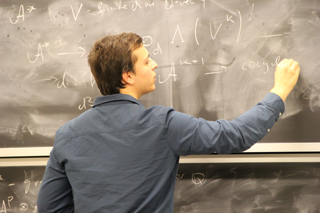In this section, Professor Haynes Miller shares the kind of feedback he provides students during their post-talk debriefing sessions.

Lyubo Panchev, a graduate student, gives a lecture in the 2014 offering of the Kan Seminar. (Photo courtesy of MIT OpenCourseWare.)
Students and I meet to debrief after each of their talks. After their initial talk, I offer midcourse guidance; I advise them to be more or less ambitious, to provide more or fewer details, etc. I try to dissuade them from packing too much content into a 50-minute presentation. I encourage them to curate their material so that they can present it clearly and in a relaxed manner. Everyone is happier when presentations are clear and relaxed—and the speaker is happier, too.
In addition to comments like these, I also point out gaps in students' presentations and moments when they may have hit a wall in their lectures. We discuss moments during which they may have left the audience with several questions. I also routinely share with students how it felt to be a member of the audience at different junctures in the lecture. I let them know at what points in the lecture I felt happy as an audience member because the content was clear and illuminating, as well as at what points I felt uncomfortable because the content was unclear or a question was left hanging. Acting as a witness is a major role of the instructor in this course.
These feedback sessions are very important because they are opportunities to talk with students about content with which they may not have been ready to engage before their talks. Because they give public talks about the content, students take ownership of the content and they're in a position to learn. They are receptive to learning in a way they would not be if they didn't have this sense of ownership. I try to maximize this opportunity by discussing with them concepts they might not have been able to listen to and fully process before giving their talk.
